Top: Ben and Bennetta Wesseh run a timber smuggling business. Picture credit: Facebook/Ben Wesseh
By James Harding Giahyue
MONROVIA – On June 30 last year, Panther, a Liberian-registered container ship, docked at a port in Shanghai, China. Among its cargo was 21.37 cubic meters of timber from the Freeport of Monrovia. The wood had left Liberia on May 31, transiting in Abidjan, Ivory Coast for nine days before its final voyage to the Chinese southern shoreline.
The company shipping the wood was Liberia Export & Import Expert Inc., a Liberian firm owned by Ben Wesseh, a veteran customs broker. The consignment came from 613 pieces of wood that had been harvested in River Cess County, according to a permit authorizing the shipment.
The Shanghai shipment was one of several Liberia Export & Import Expert Inc. made in the last 14 years outside Liberia’s legal channel for timber export or “LiberTrace.” A February DayLight investigation found Mr. Wesseh and his daughter Benetta Ben Wesseh forged the permit and another document to smuggle the timber, which they denied. Now, the newspaper has found additional evidence, providing more details of the Wessehs world of illegal timber trafficking.
56 exports in eight years
Mr. Wesseh formed Liberia Export & Import Expert Inc. on April 11, 2011, to export timber, minerals, and other things, based on its article of incorporation and business registration certificate. He holds 60 percent of the company’s shares, with the remaining outstanding, while Ms. Wesseh runs the business.
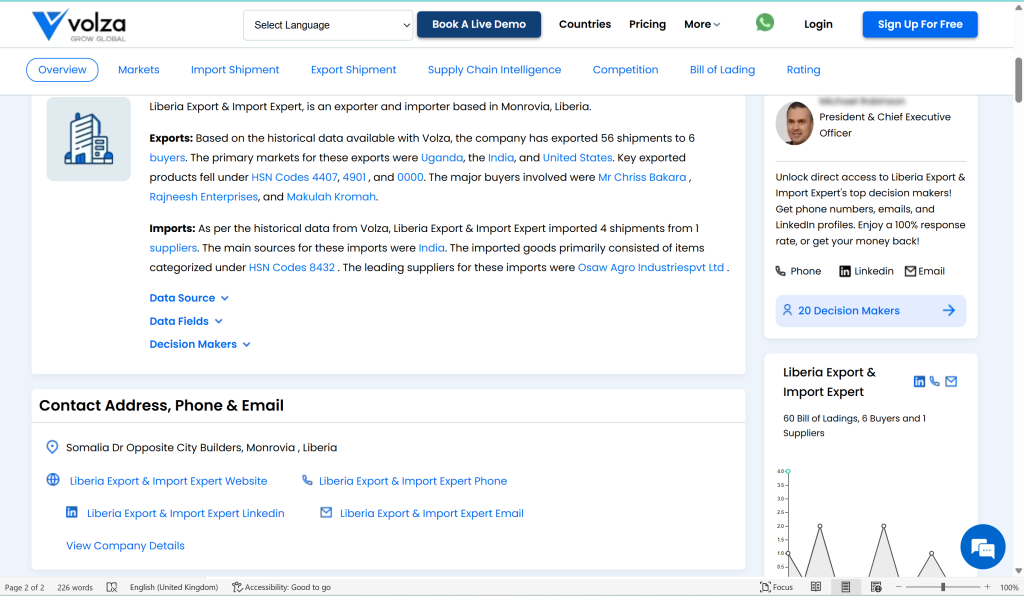
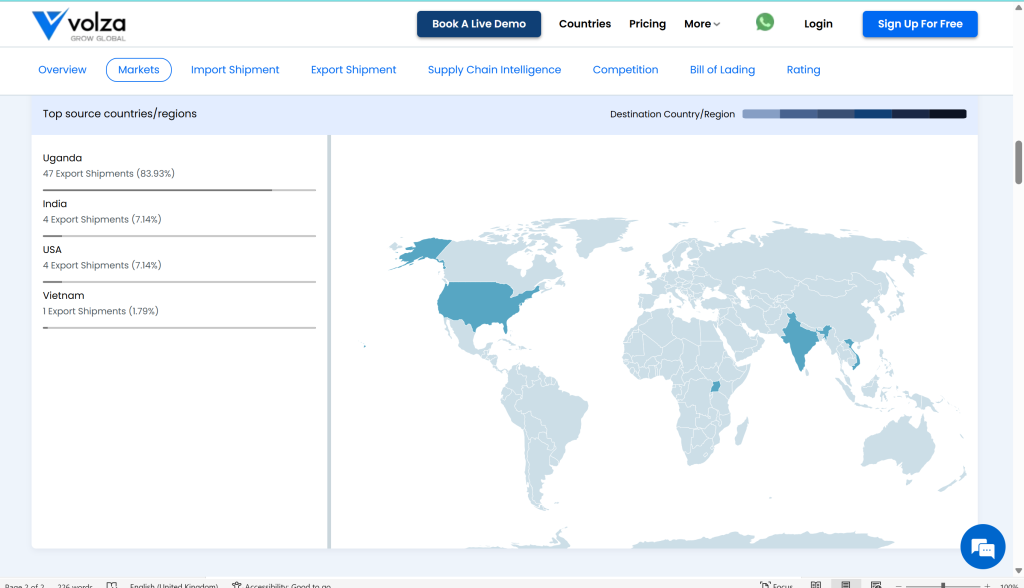
Records from the Ministry of Commerce & Industry, the Liberia Revenue Authority, and a shipping line show that the Wessehs exported timber multiple times in the last three years. The records further establish that they made two shipments in 2022 to a Taiwanese manufacturer called Strong Industrial Co. Ltd. The ministry’s records also show that a second consignment went to the same buyer. Also, the date on the first shipment matches the one on the ministry’s record.
But there were other exports than just those three, a lot more.
As of 2019—eight years after establishing their company—the Wessehs had exported timber and other goods 56 times, according to Volza, a UAE-based company that researches international trade data from over 90 countries.
Of that number, 47 went to Uganda to an individual named Chriss Bakara, four to India for a firm called Rajneesh Enterprises, and four to the United States for an individual named Makulah Kromah. A lone export went to Vietnam for Thanh Hoa Mineral Joint Stock Company. Freeport, opposite City Builders—the Wessehs’ business address in the Volza system—was consistent with the address in their company’s legal documents.
The evidence shows the Wessehs traded expensive ironwood, the type used in outdoor construction and shipbuilding for their resistance to wear and tear. Volza documented that the Wessehs’ lone Vietnamese export was 20 cubic meters of tali (Erythrophleum ivorense), a wood used for frameworks that are exposed to bad weather.
Volza’s data on the Wessehs were the same as the ones compiled by ImportKey, a firm that tracks American shipments, and Trademo, a US-based company that provides supply chain intelligence.
Amid the Wessehs company’s well-documented export history, there is no trace of Liberia Export & Import Expert Inc. in LiberTrace, Liberia’s legal channel for the timber trade. A LiberTrace search screenshot shows the company is not registered there, proof it has never used the system before.
This violates several laws and regulations, including the Regulation on Establishing a Chain of Custody System, meant to prevent illegal Liberia timber from entering international markets. By doing so, the Wessehs evaded a significant amount of taxes, including land rental, harvesting, transfer, stumpage and other fees.
Fake Document
Finding additional evidence of the Wessehs’ illegal activities was much harder than detecting the forgery of the Forestry Development Authority (FDA) and the Ministry of Agriculture’s documents to smuggle the Shanghai consignment.
The newspaper began with the FDA document. First, it was addressed to Benetta Ben [Wesseh] but greeted her as “Mr. Ben.” Then it was signed by Mike Doryen in July 2024, five months after he had been replaced by Rudolph Merab as the FDA Managing Director. It miscounted the period July 25 – September 25 as 45 days, instead of 60 days. Turns out, a revenue receipt number detailed in the permit had been issued to one Albert Chie, perhaps not the Grand Kru senator, who denied knowledge of it or any affiliation with the Wessehs.
The Wessehs did a better job faking a phytosanitary certificate, a document that certifies that timber being exported is pests-free. Though the certificate is a requirement for timber export or import, it is rarely issued, based on The DayLight’s review of several companies’ tax histories.
Armed with that information, the newspaper contacted the quarantine department at the Ministry of Agriculture, which issues such certificates. Unsurprisingly, the department denied it issued the Wessehs the document.
“I want to categorically state here that this document is fake,” said Lawrence Massaquoi, the deputy director of the quarantine department. “I did not issue this certificate. People are using our names to carry on these criminal acts.”
Other evidence suggested that the Wessehs sold the forged documents to other potential smugglers. A screenshot of a WhatsApp conversation between Mr. Wesseh and an individual reveals Mr. Wesseh solicited over US$1,350, including US$325 for a pair of FDA documents and US$75 for a phytosanitary certificate.
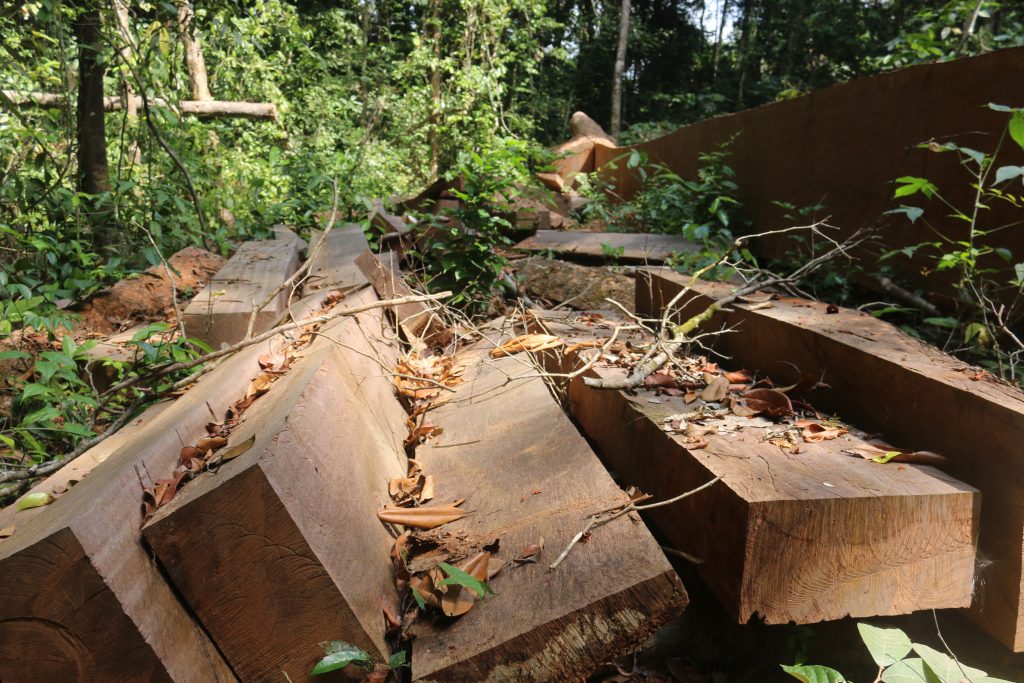
The DayLight obtained audio recordings of those unscrupulous deals. In one recording, Ben Wesseh provided details of forged documents he had sent to a potential customer. His count of the documents matched the ones The DayLight obtained.
“I sent the FDA paper for you first. Then, I sent the agriculture paper two or three times,” Mr. Wesseh can be heard saying.
Interestingly, Liberia Export & Import Expert Inc.’s tax history shows that the Wessehs have only paid three times for timber exports. They also paid for a phytosanitary certificate once. The timber payments occurred in 2017, and the certificate two years after.
No Actions
The Wessehs’ illegal activities contribute to Liberia’s deforestation, one of the highest in the world. From 2002 to 2023, Liberia lost 347,000 hectares of primary forest, according to the Global Forest Watch, which tracks global deforestation. In that same period, River Cess— where the Shanghai-bound timber were harvested—lost 28,000 hectares of primary forest.
Mr. Wesseh did not turn out for a scheduled interview. However, in a February WhatsApp interview, Ms. Wesseh denied any wrongdoing. “First of all, our company has never and will never get involved with fraud or exploiting [the] government,” said she.
“Take care.” She and her father locked their Facebook profiles, where the newspaper had gotten their pictures.
It has been about two months since the Wessehs were first exposed, yet authorities have not acted significantly. The DayLight has written the National Customs Brokers Association of Liberia (NCBAL), the FDA and the Ministry of Agriculture. However, none has taken any actions, except that the ministry lodged a complaint with the NCBAL.
This is a usual outcome for forestry. A case against a Caldwell syndicate recently jailed has not gone to court. That is the same as the one against alleged smugglers who turned the Central Agriculture Research Institute into a sawmill. Before those two, in 2022, two Korean timber smugglers walked scot-free after prosecutors had failed to indict them.

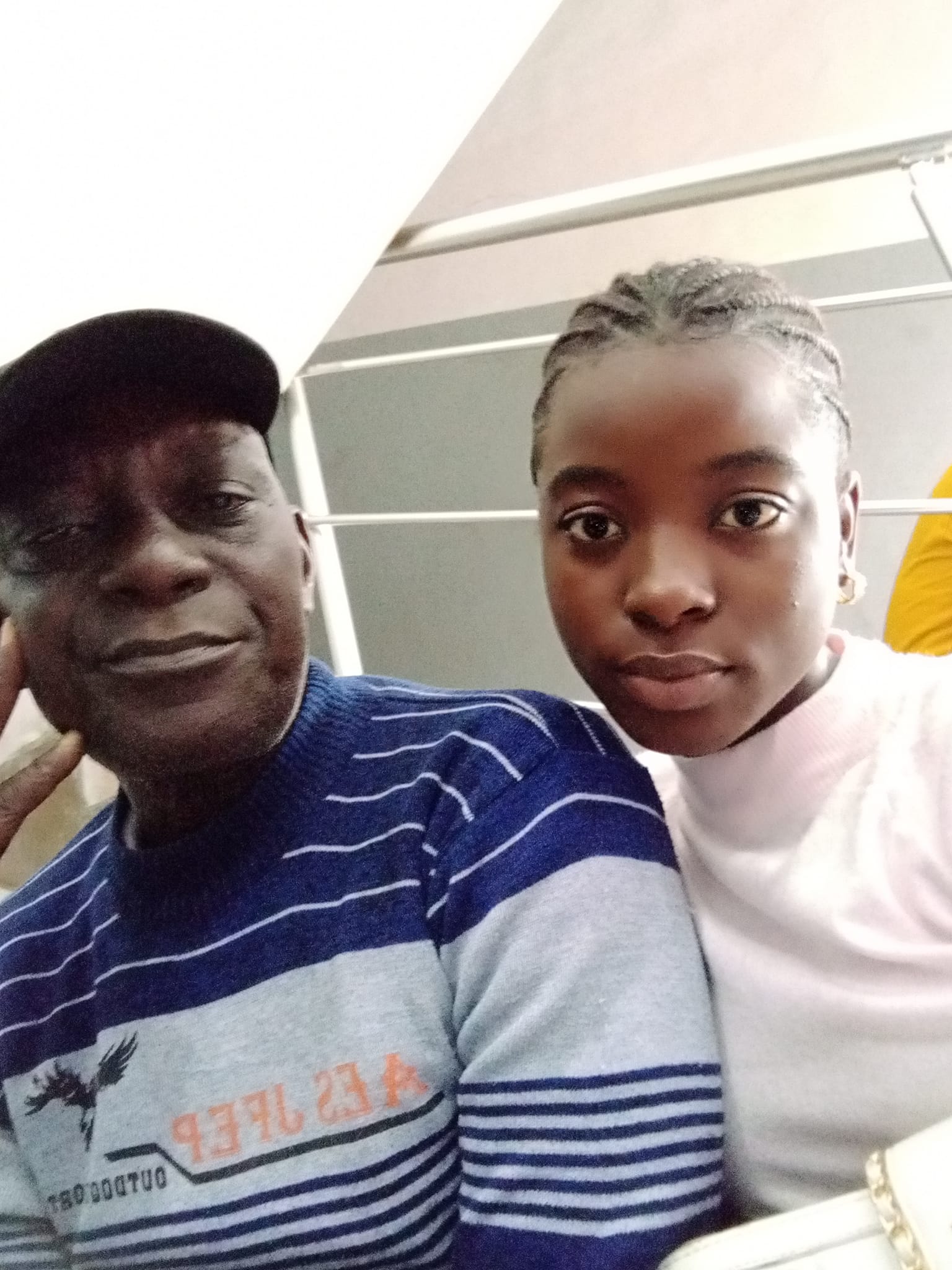

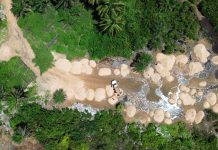
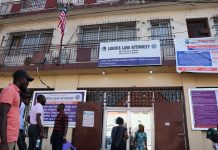
Facebook Comments